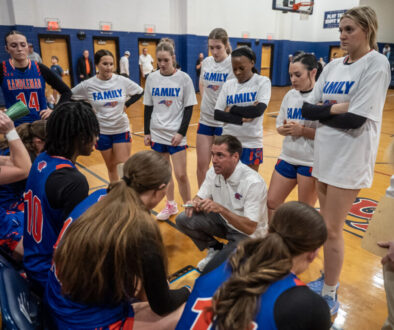Waiting for conference configurations factors into NCHSAA meetings
ASHEBORO — Putting together conferences for the new North Carolina High School Athletic Association classifications is a priority and that became a factor regarding several topics during last week’s bi-annual meetings.
Stephen Gainey, the superintendent of the Randolph County School System, is serving as NCHSAA president. He said the overwhelming issue that schools want resolved is the release of the next conference alignments in the newly configured eight-class set-up.
“I want that information as soon as possible,” Gainey said.
Gainey said the board dealt with “a lot of operational issues” during its gathering in Chapel Hill. He said it was prudent to hold off on some decisions to assess the ramifications of the realignment.
“I was really proud of the board on some of the things that we discussed, the tabling of issues,” Gainey said. “… So we don’t do something that we have to undo or touch again (in a few months).”
Gainey and NCHSAA commissioner Que Tucker said schools need the conference assignments as soon as possible so they can start creating their league-specific guidelines and work on scheduling.
Among the topics that were tabled was a proposal to create separate classifications for charter and non-boarding parochial schools. Those also might fall into a category of non-districted schools.
“There are things that make you curious,” Gainey said. “… This is not an overnight issue.”
The proposal came from Nash Central.
“We owe it to them to do everything we can to try to ensure fairness, equity, etc.,” Tucker said.
Gainey said it’s an intriguing topic for the right time.
“They’re part of our membership,” Gainey said. “There are some strong comments. We’ve been made aware of some things. … We are going to explore that. Our No. 1 priority is going to be finish the realignment process.”
Tucker offered a reminder related to schools that might be considered non-traditional public schools.
“You can not recruit for athletic purposes,” she said.
Also tabled was a discussion on whether the NCHSAA should sanction girls’ flag football.
Also, Tucker said changes to eligibility reports should aid athletics directors in terms of reducing duplication of work.
For instance, game officials will be responsible for logging information related to yellow cards and red cards in soccer, taking that task away from coaches and athletics directors. That could begin with girls’ soccer in the spring, though no longer than the 2025 boys’ soccer season.
“How can we help our student-athletes, and at the same time it helps our athletics directors,” Tucker said.
 Twitter
Twitter Facebook
Facebook Instagram
Instagram



Waiting for conference make-ups factors into NCHSAA meetings | Dailywise
December 9, 2024 @ 5:45 am
[…] Story continues […]